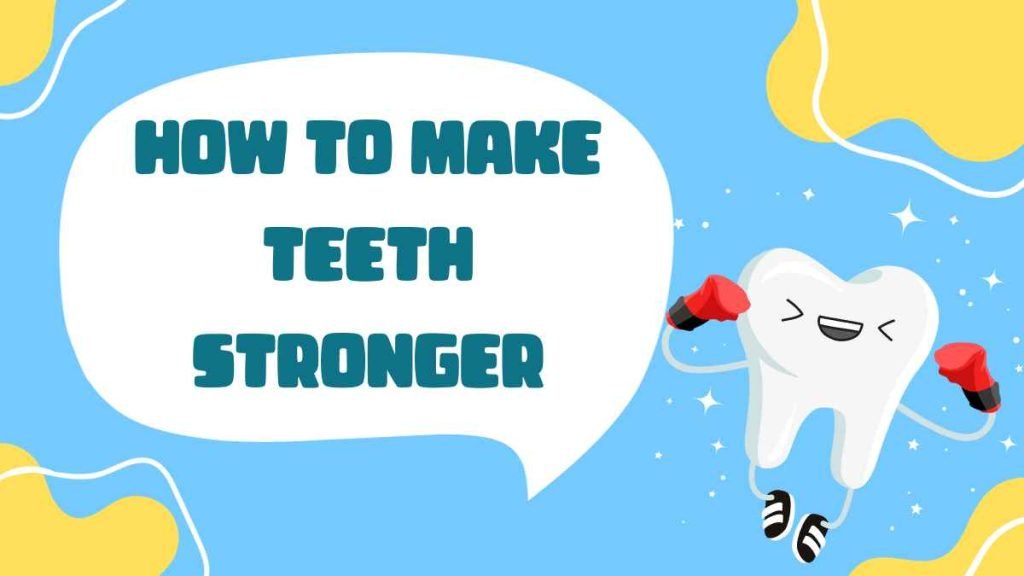How to Make Teeth Stronger! Smiling is a universal language, and having strong, healthy teeth can boost your confidence and overall well-being. However, achieving and maintaining strong teeth involves more than just regular brushing. In this comprehensive guide, we will explore How to Make Teeth Stronger. Here we will explore why having robust teeth is essential, what causes weak teeth, common mistakes to avoid, and most importantly, a step-by-step guide on how to make your teeth stronger. So, let’s embark on this journey towards a healthier, stronger smile.
Table of Contents
Why Having Strong Teeth is Essential
Having strong teeth is not just about a radiant smile; it’s crucial for your overall health. Strong teeth enable proper chewing, aiding digestion, and ensuring you can enjoy a variety of foods. Additionally, they contribute to clear speech and facial structure, preventing issues like jaw pain or headaches.

How to Make Teeth Stronger: A Step-by-Step Guide
Here you can checkout the step-by-step guide about How to Make Teeth Stronger:
Total Time: 10 minutes
Healthy Diet for Strong Teeth
A balanced diet rich in calcium, phosphorus, and vitamin D is essential. Dairy products, leafy greens, and fortified foods are excellent sources. These nutrients promote strong enamel and help in repairing weak spots on your teeth.
Regular Brushing and Flossing
Brush your teeth at least twice a day with fluoride toothpaste and use dental floss daily. Proper oral hygiene removes plaque, preventing tooth decay and gum diseases.
Fluoride Treatment
Fluoride strengthens enamel, making it more resistant to decay. Many toothpaste brands and professional dental treatments contain fluoride. Consult your dentist for the right fluoride products and treatments for you.
Avoid Sugary Foods and Drinks
Sugar feeds harmful bacteria in your mouth, leading to enamel erosion and cavities. Limit sugary snacks and beverages, especially between meals. Opt for water, which helps cleanse your mouth and strengthen teeth.
Regular Dental Check-ups
Regular visits to the dentist are vital. Professional cleanings remove stubborn plaque and tartar, and dentists can detect issues early, preventing further damage.
Use Mouthwash
Antibacterial mouthwash kills harmful bacteria, promoting overall oral health. Choose an alcohol-free mouthwash to avoid drying your mouth, which can lead to bad breath and weak teeth.
What Causes Weak Teeth?
Several factors can weaken teeth:
- Poor Oral Hygiene: Inadequate brushing and flossing allow plaque buildup, leading to decay.
- Acidic Foods and Drinks: Citrus fruits, sodas, and other acidic foods erode enamel.
- Dry Mouth: Lack of saliva increases the risk of cavities as saliva neutralizes acids and remineralizes enamel.
- Bruxism (Teeth Grinding): Teeth Grinding wears down enamel, weakening teeth over time.
- Genetics: Some people may be genetically predisposed to weaker enamel.
- Smoking and Alcohol: Both can stain teeth and weaken gums, leading to tooth loss.
Common Mistakes to Avoid
Ignoring Tooth Sensitivity: Sensitivity could indicate weak enamel. Ignoring it might lead to more severe problems. Consult your dentist for proper care.
Overbrushing: Brushing aggressively or with a hard-bristled brush can erode enamel. Use a soft-bristled brush and gentle, circular motions.
Delaying Dental Visits: Regular dental check-ups help detect issues early. Delaying visits might worsen dental problems, leading to costly and invasive treatments.
Benefits of Strong Teeth
Having robust teeth offers various benefits:
- Confidence: A healthy smile boosts self-confidence.
- Better Overall Health: Oral health is linked to overall health; strong teeth reduce the risk of infections and diseases.
- Comfort: Strong teeth enable pain-free eating and speaking.
- Financial Savings: Preventive dental care costs less than extensive treatments for severe dental issues.
Tips and Tricks for Strong Teeth
Chew Sugar-Free Gum: Chewing sugar-free gum stimulates saliva production, aiding in neutralizing acids and strengthening enamel.
Limit Staining Foods: Cut down on coffee, tea, and red wine to prevent stains. If you consume them, rinse your mouth afterward or use a straw to minimize contact with teeth.
Stay Hydrated: Water is essential for oral health. It washes away food particles and keeps your mouth hydrated, preventing dry mouth and bad breath.
Facts About Strong Teeth
- Enamel is the Hardest Substance in the Human Body: Enamel protects teeth from daily wear and tear.
- Saliva Protects Teeth: Saliva contains minerals that help rebuild enamel and fight bacteria.
- Tooth Sensitivity Indicates Problems: Sensitivity to hot, cold, or sweet foods might indicate weak enamel or other dental issues.
Conclusion
In conclusion of How to Make Teeth Stronger, a confident smile starts with strong teeth. By following a healthy oral care routine, maintaining a balanced diet, and avoiding harmful habits, you can ensure your teeth stay robust and healthy. Regular dental check-ups are key to catching problems early. Remember, your oral health is a mirror to your overall well-being, so invest in it wisely. Here you can checkout that How to Fix Pacifier Teeth.
FAQs About How to Make Teeth Stronger
How often should I visit the dentist for a check-up?
It’s recommended to visit the dentist every six months for a routine check-up and professional cleaning.
Can weak teeth be hereditary?
Yes, genetic factors can contribute to weak enamel, making some individuals more prone to dental problems.
Is it possible to reverse tooth sensitivity?
In some cases, tooth sensitivity can be managed or reduced with proper dental care and desensitizing toothpaste.
Are natural remedies effective in strengthening teeth?
While some natural remedies like oil pulling and fluoride-free toothpaste have gained popularity, their effectiveness is debated among dental professionals. Consult your dentist for personalized advice.
Can teeth grinding be prevented?
Teeth grinding often occurs unconsciously, especially during sleep. Using a mouthguard can protect teeth from damage caused by grinding.
Is it necessary to use mouthwash daily?
Using mouthwash daily can contribute to oral hygiene, but it’s not a substitute for brushing and flossing. Consult your dentist for recommendations on the best mouthwash for your needs.
Are there specific foods that can naturally strengthen teeth?
Dairy products like milk and cheese are rich in calcium and phosphorus, essential for strong teeth. Crunchy fruits and vegetables like apples and carrots can also help clean teeth naturally.


